There have been significant changes to the blood transfusion service with the introduction of a new system that will transform the service. Blood Transfusion Technical Lead, Anna Capps-Jenner explains how great teamwork made the changes possible.
A logistical challenge
 Patient safety is at the heart of the blood transfusion service. It’s a UK-wide service and comprises seven regional BT labs servicing 39 hospitals covering the country from Kent to Scotland. However, with newer technology available and rising volumes, the time had come to replace the old BARS remote blood tracking and blood issue system. The new BloodTrack system supplied by Haemonetics was installed and is now fully operational.
Patient safety is at the heart of the blood transfusion service. It’s a UK-wide service and comprises seven regional BT labs servicing 39 hospitals covering the country from Kent to Scotland. However, with newer technology available and rising volumes, the time had come to replace the old BARS remote blood tracking and blood issue system. The new BloodTrack system supplied by Haemonetics was installed and is now fully operational.
Being such a diverse and widespread facility required a clear transformation strategy and rollout approach. 33 sites had to replace both their blood fridge and a tracking system kiosk. This resulted in having to shut down the old system for three months. It also meant not only maintaining business continuity, but installing and validating the new system, while training both our own and hospital staff on the new system.
The benefits of teamwork
“The project was a really good example of how the teams within the organisation operated to support each other.”
Installing a completely new system not only involved coordinating teams from IT, QA and Facilities Management, but because the automated system was effectively down, we relied on a manual version. Our couriers played a crucial role to deliver all the extra transfers that were needed to ensure blood stocks were always available and replenished.
Introducing a completely new system inevitably created a substantial quantity of paperwork: lots of physical equipment testing and report writing was carried out by the lab staff - a testament to their efforts.
Training the trainers
 Another aspect that was key to the success of the project was a coordinated training programme for hospital staff. A train-the-trainer system was developed which involved weekly online training sessions, and two dedicated training labs were also set up, in Ealing and Manchester, where face-to-face training was also delivered.
Another aspect that was key to the success of the project was a coordinated training programme for hospital staff. A train-the-trainer system was developed which involved weekly online training sessions, and two dedicated training labs were also set up, in Ealing and Manchester, where face-to-face training was also delivered.
Members of Chris Sweetman-Wright’s POCT training team provided all the training resources. Just four people delivered around 1,000 training sessions over a short, nine-week period. Anna’s laboratory team then had to update the considerable number of training records needed for lab and hospital teams to operate the new system.
The BloodTrack system is now up and running successfully. Anna and her team are once again at the centre of a huge logistical operation that will now be made easier with the new arrangements, and ensure the efficient and timely delivery of blood to the patients who rely on it.
